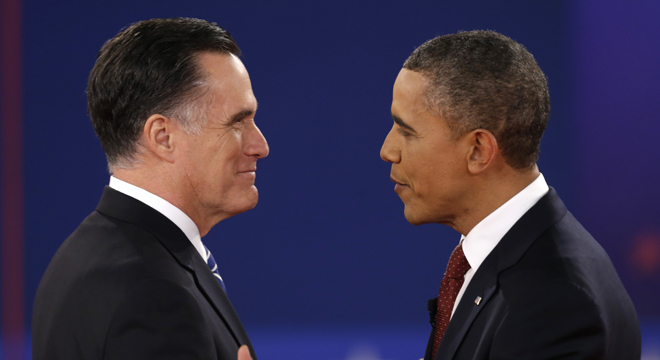Updated at 7:51 a.m.
FT. LAUDERDALE, Fla. — All eyes are on Boca Raton Monday, where President Obama and Mitt Romney will meet for their final debate before election day.
The debate, which is focused on foreign policy, has generally garnered less anticipation than the previous two matchups given the strong economic theme of the election. But given how close the race has become — thanks in no small part to Romney’s performance thus far — and the surprisingly robust audience for the debates this year, it could prove significant.
For one thing, the timing couldn’t be better. A pair of bombshell stories over the last week — one on the administration’s intel on the Benghazi attack, an issue that tripped up Romney in the second debate, the other on the possibility of direct talks between the United States and Iran over its nuclear program — mean that the debate could produce hard news.
Another reason it might have an impact: foreign policy need not be as restrictive a topic as it sounds. Questions on trade policy, for example, could give each candidate a chance to either pivot to their jobs plans or exploit their opponent’s vulnerabilities.
And while it may not be the driving topic of the current election, the country is only four years removed from a 2008 election in which one of Obama’s defining selling points for nearly the entire campaign was his early opposition to the war in Iraq.
This undercurrent hasn’t gone away entirely. Obama supporters at his Fairfax, Va., rally last Friday brought up foreign policy surprisingly frequently in interviews with TPM, with many expressing concern that Romney’s saber-rattling on Iran and much-derided visit to London pointed to a tumultuous term abroad. Likewise, Romney supporters in Ft. Lauderdale, Fla., on Sunday were still livid over Obama’s handling of the Benghazi attack, which has quickly become a popular issue at least among the GOP base.
With that in mind, here are a few likely flashpoints to watch in the third debate.
Libya: The Obama administration has been on the ropes in recent weeks over what Republicans allege is an evolving and incomplete explanation for how the Benghazi attacks were planned and carried out. Congress is also investigating whether the consulate in Libya was properly secured and defended.
For all of the president’s vulnerability on the topic, Romney has had trouble discussing the issue. In the second debate, he flubbed his response to a question on Libya, leading to an embarrassing mid-debate correction from moderator Candy Crowley. Before that, he offered up an inaccurate and over-the-top attack the night of the attacks themselves, leading to a hail of criticism from across the ideological spectrum.
Romney’s almost certainly spent the week replaying that second debate answer and coaching himself for its near-certain follow up on Monday. But the Libya story is also growing more complicated by the minute. A recent Washington Post story suggests that some of the early public statements from the administration were based on CIA assessments that the Benghazi assault was tied to an anti-Muslim video that prompted protests across the region.
Iran: Romney has accused Obama of failing to rein in Iran’s nuclear program. Obama has accused Romney of armchair quarterbacking, insisting that his efforts to expand sanctions with international support have strengthened America’s hand. Since Romney has also endorsed sanctions, Obama has challenged Romney to openly call for a military strike (which he has not done) or drop his criticism.
The debate features a new wrinkle to the story, however: a New York Times report that Iran is willing to meet for direct talks on its nuclear program with the United States, but only after the election when they know which administration will be handling talks. The White House has denied that anything’s been agreed upon. While he’s unlikely to offer details on sensitive diplomatic talks, Obama could cite the reports as evidence sanctions are crippling the Iranian economy into submission. Romney might seize upon talk of negotiations as a stalling tactic by Iran and pledge a harder line.
China: Here’s an issue that could get off topic fast. Romney has cast himself as a trade warrior throughout the campaign, telling blue collar workers he’ll crack down on alleged violations by China in order to protect U.S. manufacturing jobs.
Obama’s response, however, has been less to attack Romney’s policy prescriptions so much as Romney’s personal biography. In the second debate, he brought up Romney’s investments in countries that outsourced work to China, a theme that the campaign has also used in a slew of Ohio ads. One news twist to look for: Romney’s infamous hidden fundraiser tape contained a clip in which the Republican nominee described traveling to China to buy a factory, only to be horrified by its mostly female workers’ squalid living conditions and low pay. Despite repeated requests from reporters, Romney has refused to confirm or deny whether he ended up purchasing the factory, which resembles a Chinese manufacturing company that Bain invested in. Will Obama challenge him to definitively answer whether Romney knowingly profited from such brutal labor practices?






